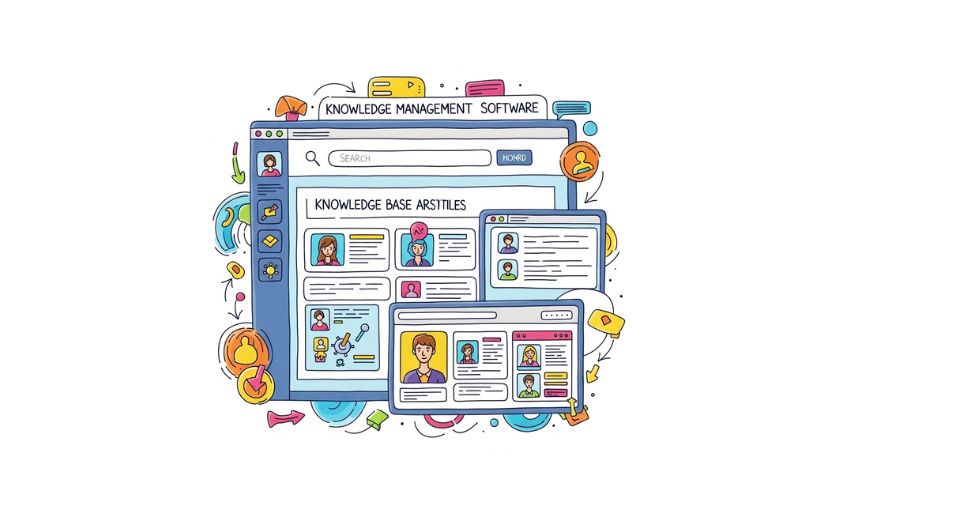
Jun 17, 2025

The new release launched by Metastat Insight provides a detailed overview of the changing trends in the Global Knowledge Management Solutions Market, showcasing how businesses from industries are not just investing more, but are doing so in more disciplined ways to sift and utilize information. When gigabytes of information are generated daily, the need for utilizing disjointed content as actionable intelligence cannot become more imperative. The essence of knowledge management is reducing access to internal experience, documentation, and experiential expertise in a way that triggers decision-making and promotes consistency between teams and departments. This progressive business need has shaped the way organizations select and implement systems designed to capture institutional knowledge and augment operation smoothness. As more corporations experience changes such as workforce changes, hybrid work schedules, and cross-geographic collaborative projects, they are increasingly shifting toward solutions that go beyond basic data storage.
Such applications are designed not merely to hold information, but to provide the right stuff to the right individuals at the right time. That context-awareness has been the point of departure for what knowledge management is all about nowadays. Whether in customer service departments, legal departments, product development teams, or corporate training programs, the need for having the capability to locate and use pre-screened content at the drop of a hat has led to a tremendous shift in how internal knowledge is structured and retrieved. The Global Knowledge Management Solutions Market is meeting these needs by adopting tools that are flexible to more than one workflow, including an added level of assistance for understanding complex procedures and sector-specific knowledge bases. Unlike earlier versions that were repositories only, present systems allow for integration with other enterprise systems and make the embedding of knowledge into day-to-day routines possible directly.
The ability to surface germane insights without disrupting the normal flow of activity of a worker is emerging as a signature characteristic of contemporary systems. The answers are increasingly being constructed to facilitate intuitive navigation, personalized recommendations, and feedback loops that help improve the quality and accuracy of accumulated knowledge over time. One interesting trend that is shaping the marketplace is the way businesses are leveraging knowledge management not only as an infrastructure application but also as a vehicle for continuous improvement. By analyzing knowledge gaps or frequent questions, businesses are turning what was once fixed content into dynamic insight. This allows them to update documentation, improve training content, and even refine customer-facing initiatives.
Also, the in-built collaboration features embedded in most systems are helping organizations move beyond information silos towards an open, collaborative culture. Employees at different levels and from diverse departments can contribute, validate, and construct collective knowledge without requiring a single gatekeeper or sequential hierarchy. Cloud-based availability and elasticity have also changed how organizations react to these systems. They are no longer regarded as stationary installations that require a massive investment in infrastructure. Instead, they now form an integral part of a larger digital strategy in which companies start small and increase their scope in incremental steps. This shift has encouraged a wide variety of industries to consider knowledge management, ranging from healthcare and finance to manufacturing and education.
Every sector poses unique challenges, whether it is regulatory complexity, technical terminology, or multilingual documentation. Analog systems designed to address that challenge are gaining more popularity in the marketplace, one that is expanding not through conformity but through accommodation. A core aspect driving the utilization of knowledge management systems is usability. In spite of the complexity of the system, if it is challenging to use or cumbersome to maintain, the effort tends to produce little lasting value. Firms in the Global Knowledge Management Solutions Market are responding to this by investing in user-centric design, with interfaces being clean, functional, and responsive. Ease of onboarding, clarity of information architecture, and analytics that are actually useful are becoming business-as-usual rather than add-on features. This emphasis on user experience is shaping not just product design but also how services are architected, from implementation through support.
One of the less overt trends is growing emphasis on content lifecycle management. It's not enough to store documents; they must be updated, revised, retired, or replaced from time to time. If not, the system becomes clogged with stale or useless content. Organisations are realizing that a sustainable knowledge management solution requires governance—not just tools. Defining keen ownership, instituting review schedules, and requesting user feedback are all part of this change. Suppliers are creating functionalities that enable this ongoing maintenance, where organizations can retain the value and integrity of their internal knowledge base.
The Global Knowledge Management Solutions Market is also witnessing increasing interest in AI-powered functionalities, particularly in cases where high volumes of unstructured information have to be processed. Artificial intelligence and machine learning tools are now being applied to extract meaning from, organize content, and even suggest relationships between unrelated bits of information. This has created the opportunity for more proactive uses, where systems anticipate what people need and proactively offer valuable information. While such technologies remain in the process of development, their presence signals a broad shift toward systems that not only aid but also learn from the user.
Overall, the snapshot provided by Metastat Insight in its Global Knowledge Management Solutions Market report is that of a market that is serenely remaking organizations' thinking on expertise, learning, and business continuity. Anything short of static repositories, today's knowledge systems are productivity and collaboration engines that are dynamic. They are strategic tools for fueling company culture, process optimization, and competitive strength. Whereas companies still search for brighter, more flexible ways to leverage their internal know-how, the answers in this category are poised to meet those nuanced demands with flexibility and precision.
Drop us an email at:
Call us on:
+1 214 613 5758
+91 73850 57479